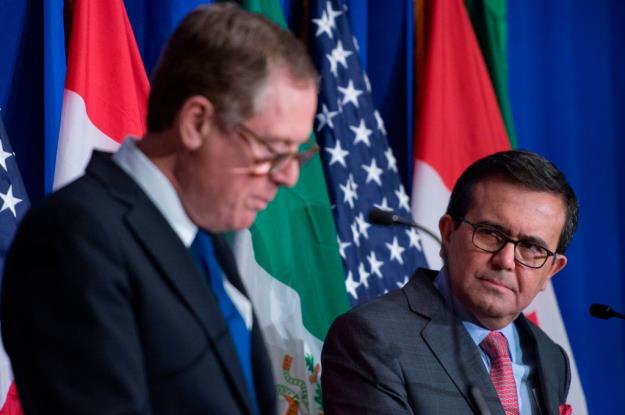Following Tuesday’s events, it is not an exaggeration to say that the North American Free Trade Agreement (NAFTA) is on life support, and it is unclear whether the patient will even survive into the coming year.
Though the advance writing was flashing brightly on the wall, the three lead NAFTA negotiators put paid to the idea of an early agreement when they appeared jointly at the end of the fourth negotiation round in Washington on Oct. 17. Citing unspecific challenges and conceptual gaps among the negotiation teams, Canada, the United States and Mexico decided to postpone the next negotiation round until Nov. 17, when negotiators will presumably gather again in Mexico City. In a joint statement, negotiators also declared that the talks will likely continue into 2018, the first postponement of the original schedule and a timeframe that takes the talks closer to Mexico’s politically-charged elections in June.
Perhaps more consequential was the strong language that negotiators have begun to use with reference to each other, essentially questioning the good faith of their counterparts. Difficult and complex issues can be negotiated within a spirit of goodwill; a prevailing mood of suspicion and zero-sum positions will make conclusion of the agreement much more difficult if not impossible. The new demands that the U.S. has just brought to the negotiations, including dispute resolution procedures, sunset provisions, and local content requirements, among others, are not designed to forge consensus but rather to upend the entire agreement.
In the meantime, the next month will essentially be a cooling off (“intercessional”) period and opportunity for all three governments to take a hard look at what they have at stake, and what they threaten to forego if the negotiations fail. But significant and lasting damage has already been done. The trust that had developed through hard work over more than two decades, from trade and investment issues to security to immigration, is rapidly dissipating. Without trust as the glue holding them together, North American economic and political relations will be much more difficult to pursue effectively.
At the same time, both Canada and Mexico are now actively seeking alternative trade and investment partners, not to replace the U.S. but to supplement increasingly uncertain partnerships. This is already a strategic setback for the U.S. even if a revised NAFTA is finally, eventually consummated. At a minimum, U.S. commercial opportunities, including consumer welfare, are increasingly at risk. More broadly, the strategic position of the U.S. is diminished and it is unclear in the current environment how it will be restored.
NAFTA was not perfect, as no multilateral negotiation ever is. It was an experiment that has nonetheless proven its worth over time. For a variety of reasons it can usefully be modernized. Modernization, however, is not the current path. This is no surprise but rather the logical outcome of the Trump administration’s publicly stated approach and the popular mandate they believe that they have been elected to fulfill. Unfortunately, in international relations as in most activities, it is easier to destroy than to build. It is a lesson that must be learned and relearned. The coming weeks will expose whether we have begun to understand and appreciate this truth.
—
Farnsworth is vice president of the Americas Society/Council of the Americas in Washington, DC.









